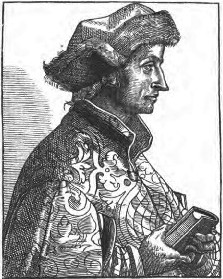1513 - Barclay, Alexander - Fourth Eclogue: Difference between revisions
From International Robin Hood Bibliography
mNo edit summary |
m (Text replacement - "</p> <div class="no-img">" to "</p><div class="no-img">") |
||
| Line 2: | Line 2: | ||
[[File:Alexander_barclay.jpg|thumb|330px|right|Alexander Barclay, a wood cut included in many early editions of his works (from | [[File:Alexander_barclay.jpg|thumb|330px|right|Alexander Barclay, a wood cut included in many early editions of his works (from | ||
[[Barclay, Alexander 1874a|''The Ship of Fools'']], 1874).]] | [[Barclay, Alexander 1874a|''The Ship of Fools'']], 1874).]] | ||
<p id="byline">By Henrik Thiil Nielsen, 2013-07-28. Revised by {{#realname:{{REVISIONUSER}}}}, {{REVISIONYEAR}}-{{REVISIONMONTH}}-{{REVISIONDAY2}}.</p> | <p id="byline">By Henrik Thiil Nielsen, 2013-07-28. Revised by {{#realname:{{REVISIONUSER}}}}, {{REVISIONYEAR}}-{{REVISIONMONTH}}-{{REVISIONDAY2}}.</p><div class="no-img"> | ||
<div class="no-img"> | |||
== Allusion == | == Allusion == | ||
<onlyinclude> | <onlyinclude> | ||
Revision as of 03:12, 17 May 2020

Alexander Barclay, a wood cut included in many early editions of his works (from The Ship of Fools, 1874).
By Henrik Thiil Nielsen, 2013-07-28. Revised by Henrik Thiil Nielsen, 2020-05-17.
Allusion
Yet would I gladly heare some mery fit
Of mayde Marion, or els of Robin hood;
Or Bentleyes ale which chafeth well the bloud,
Of perre of Norwich, or sauce of Wilberton,
Or buckishe Joly well-stuffed as a ton.[1]
IRHB comments
Alexander Barclay's Eclogues were written 1513-14. These lines are spoken by a shepherd. Though earlier sources mention "Robin et Marion", this is the first literary source to mention "Maid Marian" eo nomine. Possibly "some mery fit" is an allusion to the A Gest of Robyn Hode, which was divided into fyttes and was then in all probability the most well known Robin Hood poem.
Editions
- Barclay, Alexander, adapt.; Mantovano, Battista Spagnuoli. The Boke of Codrus and Mynalcas ([London], [1521?]). First edition.
- Barclay, Alexander, adapt.; Brandt, Sebastian; Mantovano, Battista Spagnuoli; Mancini, Dominic. 'Certayne Egloges of Alexander Barclay', in: Barclay, Alexander, adapt.; Brandt, Sebastian; Mancini, Dominic; Piccolomini, Enea Silvio; Mantuanus, Baptista Spagnuoli; Locher, Jakob, transl. Stultifera Nauis, Qua Omnium Mortalium Narratur Stultitia [...] È Latino Sermone in Nostrum Vulgarem Versa [...] The Ship of Fooles, Wherin is Shewed the Folly of All States, with Diuers other Workes Adioyned Vnto the Same [...] (Imprinted at London in Paules Church-yarde, 1570), sigs. A-D6. Second edition.
- Barclay, Alexander, adapt.; [Mantovano, Battista Spagnuoli]; White, Beatrice, ed. The Eclogues of Alexander Barclay from the Original Edition by John Cawood (Early English Text Society, Original Series, vol. 175) (London, 1928). The only scholarly edition.
- Barclay, Alexander, adapt.; [Mantovano, Battista Spagnuoli]; White, Beatrice, ed. The Eclogues of Alexander Barclay from the Original Edition by John Cawood (Burt Franklin Research & Source Works Series, vol. 150) (New York, 1960). Reprint of 1928 ed.
Lists
- Not included in Dobson, R. B., ed.; Taylor, J., ed. Rymes of Robyn Hood: an Introduction to the English Outlaw (London, 1976).
- Sussex, Lucy, compil. 'References to Robin Hood up to 1600', in: Knight, Stephen. Robin Hood: A Complete Study of the English Outlaw (Oxford, UK; Cambridge, Massachusetts: Blackwell, 1994), pp. 262-88, see p. 270.
Background
- Schultz, John Richie. 'The Life of Alexander Barclay', Journal of English and Germanic Philology, vol. XVIII (1919), pp. 360-68.
- Wikipedia: Alexander Barclay.
Brief mention
- Barclay, Alexander, adapt.; [Brandt, Sebastian]; [Jamieson, Thomas Hill], ed. The Ship of Fools (Edinburgh; London, 1874), vol. I, p. lxvii. Cites the passage noting it mentions "some of the festive tales of our ancestors".
Notes
